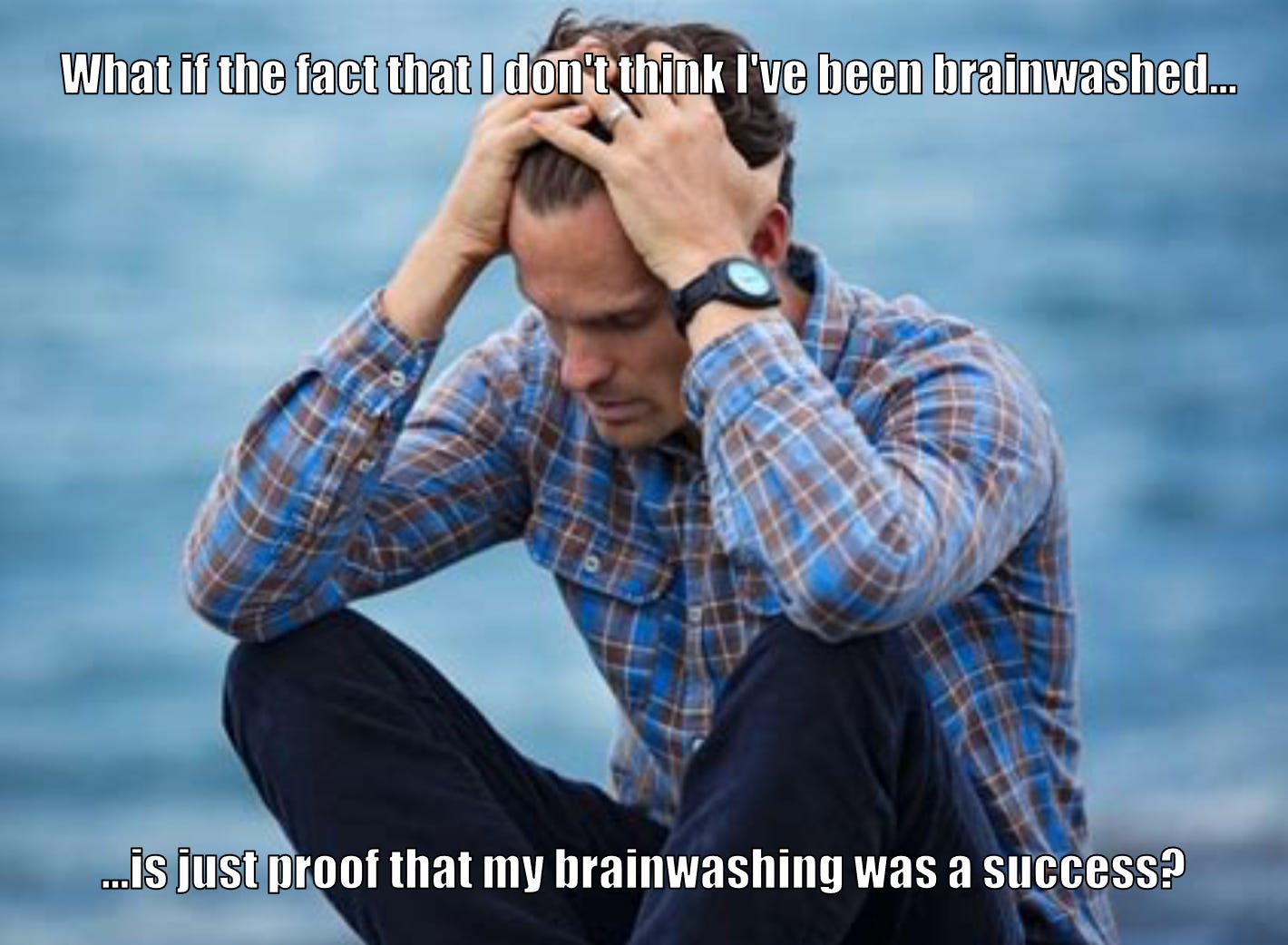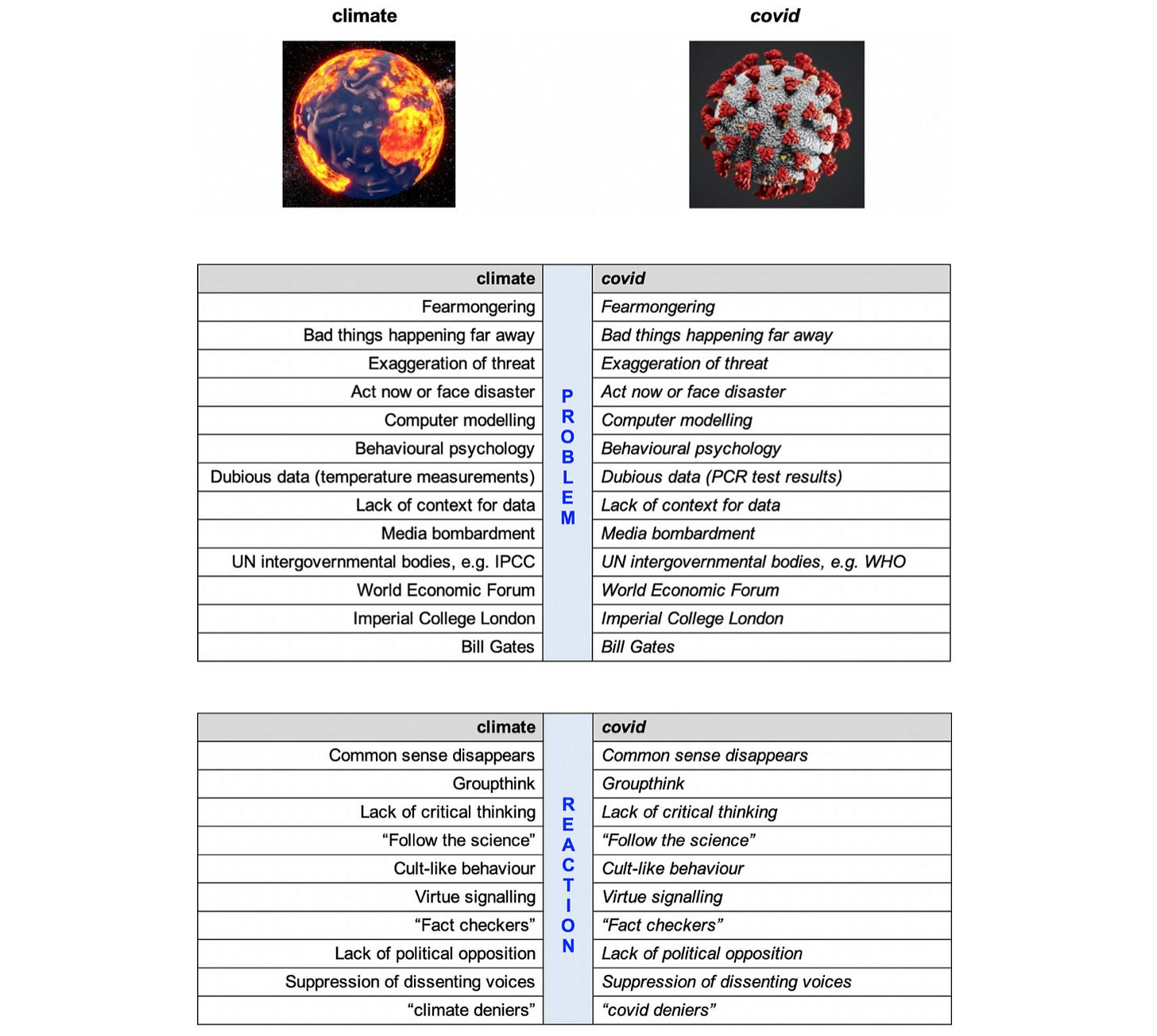How to read the media
Solving a challenging Only Connect wall; some thoughts on deception, distraction and diversion; a suggestion; and some other observations
Dear Church Leaders (and everyone else)
In this post…
I gave an example of a relatively easy question from the TV show Only Connect.
And in the footnotes section, I said: “If you like a challenge, try solving this… wall, identifying the four groups of four connected clues…”
And that I would provide a solution in the next Updates post.
But as I explained here in that next Updates post, the more I thought about it, the more it seemed to me that the solution to this particular puzzle was worth a post of its own. Not so much on its own merit, but for what it illustrates about deception, distraction and diversion.
Solving a challenging Only Connect wall
For context, on the TV show a team of three players has three minutes in which to identify the four groups of four connected clues. This is typically easier said than done, not least because of the “red herrings” (origin of phrase here) that are (I presume) designed with deception, distraction and diversion in mind.
At the outset, it is important to emphasise that this particular wall, which was set for the final of the series back in 2018, is unusually difficult. Anyone who can solve it correctly in three minutes might well go far on the TV show itself.
For the purposes of this article, I will describe a rough version of my thought process as I tackled it.
Here is the grid again:
If you haven’t already done so, maybe now is the time to try solving it?
At the outset you might spot that:
Some clues are obviously connected:
Polo and Golf are both Volkswagen cars
Romeo and Juliet are both Shakespeare characters
Davidson and Royce are both the second parts of names of vehicle manufacturers (Harley Davidson and Rolls Royce)
Cricket and Rugby are both team sports
Some are recognisable but don’t seem to fit in anywhere:
Lima (bean? capital city?)
Martin (first name? surname? bird?)
Rabies (disease?)
Tango (drink? dance?)
Some appear rather more obscure:
Potpan
Escalus
Sprucy
But while Polo and Golf are both Volkswagen cars, and while Only Connect clues are sometimes obscure, I decided to work on the assumption that the Volkswagen connection here is a red herring.
Where else might Polo and Golf fit? You might note that Polo is — as well as a car, and a mint — a team sport. And that it could thus go into a group with Cricket and Rugby. As to Golf… well, it is of course also a sport, and it can be played in teams. Or perhaps the category might just be sports.
But I also noticed, perhaps helped by having watched plenty of Only Connect, that Golf is one of the letters of the phonetic alphabet — Alpha, Bravo, Charlie, Delta etc. As are Lima and Tango. And Romeo and Juliet.
But then Romeo and Juliet are also Shakespeare characters…
As to vehicle manufacturers, Martin could relate to Aston Martin, and the remaining member of the group could be one of the clues I haven’t heard of. Sampson seems the most plausible… Potpan…? Escalus…?
So we have four contenders for groups: sports, letters of the phonetic alphabet, Shakespeare characters, vehicle manufacturers.
I reasoned that Cricket, Golf, Polo and Rugby form a complete group. There are no other obvious sports present, and I consider myself sufficiently well aware of unusual sports that I would be surprised if any of the more obscure clues fitted that category.
That would then leave us with Juliet, Lima, Romeo and Tango as the letters of the phonetic alphabet. A strong contender for a complete group.
If we were playing on the TV show, we could actually try this second set of four to see if we had made the right connection. Sometimes, when there is a group of five or more connected words that fit a given category — like Golf, Juliet, Lima, Romeo and Tango — it is helpful to try different combinations. (Which is feasible with a group of five, leaving out a different one each time. But not so much with six.)
At home, we do not have that privilege, although we can — if we choose to — look up clues that are unfamiliar. Which is what I did. And found that both Potpan and Escalus are not only Shakespeare characters, but that they both feature in Romeo and Juliet.1 As does Sampson. And then of course we also have Romeo and Juliet.
So it seems more than likely that one of the groups is not only Shakespeare characters but Romeo and Juliet characters. After all, where else could Potpan and Escalus fit?!
But we still have Rabies and Sprucy to contend with. And they don’t obviously fit into any of the groups. I know that Romeo — and not Rabies — represents R in the phonetic alphabet. And even if I didn’t know that Sierra represents S, I’d be pretty confident it wasn’t Sprucy! Moreover, Sprucy in the name of a vehicle manufacturer certainly doesn’t ring any bells.
Indeed the unusual nature of the word Sprucy might — especially to anyone who has watched Only Connect before — suggest trying e.g. to rearrange the letters. Which gives Cyprus. And then to look for anagrams of other countries, particularly from clues that don’t readily fit anywhere else. Like Serbia from Rabies.
So we now have five groups: sports, letters of the phonetic alphabet, Romeo and Juliet characters, vehicle manufacturers, anagrams of countries.
One of the groups must thus be a red herring.
In short, I was somewhat pleased to have spotted the letters of the phonetic alphabet, which didn’t seem to me the most obvious of the groups. And perhaps that was part of the reason why it took a while before it dawned on me that it could actually be the letters of the phonetic alphabet group that was the red herring!
Which was the key to solving the wall:
Sports: Cricket, Golf, Polo, Rugby
Romeo and Juliet characters: Escalus, Juliet, Potpan, Sampson
(The obvious thing might be to try Romeo and Juliet plus two other clues. But, as so often in Only Connect, the obvious thing does not necessarily lead to the correct answer.)
Anagrams of countries: Lima (Mali), Rabies (Serbia), Sprucy (Cyprus), Tango (Tonga)
Vehicle manufacturers: (Harley) Davidson, (Aston) Martin, (Alfa) Romeo, (Rolls) Royce
Phew. Well, I did say, “if you like a challenge”…
Stepping back, some important main things to take away are:
There are plenty of red herrings. Not just in terms of individual clues, but also the groups. What might at first look obvious does not necessarily lead to the correct answer. And sometimes the plausible alternative does not lead to the correct answer either.
The deception, distraction and diversion make it difficult to work out the solution. It is easy to think that we have solved different parts of the puzzle when, in reality, we are actually a long way from making the right connections that will help us to understand the big picture. It is thus important not to get bogged down in any one area.
Emotional responses can influence us and mislead us. I thought I had done well to spot the letters of the phonetic alphabet. But concentrating on that line of thought, without stepping back to consider the bigger picture, and to consider other possibilities, kept me off the path to finding the solution.
It is important to think laterally, and to keep thinking. I was sufficiently fixated on Romeo being either a Shakespeare character or a letter of the phonetic alphabet that I stopped considering other possibilities, such as whether Romeo could be part of the name of a vehicle manufacturer. The different pronunciation of Romeo in Alfa Romeo (roˈmɛːo rather than rō′mē-ō′) provides an additional distraction.
It also helps to avoid overthinking. Sometimes the groups are relatively straightforward to spot. In this case, for example, there is nothing particularly cryptic about the group of sports.
Keep in mind all the different possibilities. Sometimes on Only Connect, one of the team members makes a suggestion that, if followed up, would lead to the correct solution, but it gets ignored.
A little bit of basic research — in this case to find that some of the more obscure clues are Romeo and Juliet characters — can be very useful.
Some knowledge of how the game is played — not least from previous experience of watching the show — can be helpful.
Sometimes a cool head and logical thought is more important than almost anything else.
Some thoughts on deception, distraction and diversion
Five years ago, I would have very much appreciated this article so far, and would have considered myself to have understood the points being made. But I would have been at least somewhat puzzled as to why anyone might think that the thought process involved in solving an Only Connect wall had much to do with other things, let alone how the media operates.
In the last five years, not least during the covid era, I have come to see that the media operates in ways of which I was previously largely unaware. Operation Mockingbird, discussed in this recent post, provides some important context:
The idea of a large organisation controlling the minds and thoughts of individuals, pushing them towards a specific ideology and certain life choices, may seem like…an absurd conspiracy that can be found in books and movies.
But in the 1970s at least, it actually happened.
That said, it is still not easy to know how best to explain to someone like my 2020 self how my thinking has evolved over what sometimes feels like half a lifetime. (And that is the main reason why it has taken me so long to get round to writing this article.)
As noted in the recent Operation Mockingbird post, this piece also provides some important context for my current thinking, which I do not doubt will evolve further:
Edward Bernays’ 1928 book Propaganda, featured in the above article, leaves us in no doubt that, even a hundred years ago, the “invisible governors” were manipulating the media to their own ends. And Operation Mockingbird gives some indication of the extent to which that manipulation had evolved and expanded by the 1970s.
Even with just those two observations, it would seem to me inconceivable that something similar is not happening today. Moreover, it would surely be surprising if the scale of whatever is going on today did not eclipse what was happening fifty or a hundred years ago. And if the powers-that-be had not got rather better at disguising what they are doing.
It occurs to me that perhaps most people might agree with much of that last paragraph. They might be surprised (as I was) that such things were happening in the 1920s in the way that they were, and of the nature and scale of Operation Mockingbird. But many would, I suspect, readily acknowledge that we are manipulated by the media.
I wonder though how widely appreciated the scale and the extent of the manipulation is.
As I asked in the original Only Connect post:
Could it be that many highly educated people are so brainwashed that they are unwilling even to take seriously the notion that they could have been brainwashed?
For understanding some of the bigger picture as to what is going on, I have found it helpful to try to think about what today’s invisible governors might be working towards. We don’t actually have to speculate too much about this, because, at least up to a point, they tell us, should we choose to pay attention:
As noted in the above article, Agenda 2030 is still on the UK government website. It is an open secret.
And it is not difficult to join the dots as to what is happening more broadly, even if we don’t necessarily agree on all the details:
At the very least, it is important to discard any residual notion we might have that the invisible governors have the best interests of the general population at heart (something which, until recently, I would have thought would come naturally to those who say they believe what we are told in the Bible).
With the above in mind, we might consider how deception, distraction and diversion might be used to advance such agendas in all sorts of ways and in any of various contexts. And how the wall puzzles on Only Connect might provide some clues as to the sort of strategies that could be deployed:
Provide plenty of red herrings — in such a way that what might at first seem obvious does not actually reflect reality, and so that plausible alternatives also do not lead to people discerning what is actually happening.
Devise deceptions, distractions and diversions to make it difficult to work out what is going on. Try to convince people that they have understood aspects of what is happening when, in reality, they are actually a long way from making the connections that will help understand the big picture. Encourage people to get bogged down in one area or another.
Use behavioural psychology to manipulate and mislead. Persuade people that they are thinking along the right lines with the red herrings, and that they don’t need to step back to consider the bigger picture.
Discourage people from thinking laterally. Keep control of the Overton window — the range of subjects and arguments politically acceptable to the mainstream population at a given time.
Encourage overthinking, so that people are less likely to see the wood for the trees.
Suppress and discredit voices questioning the narrative, making use of terms such as “conspiracy theorist”, “far right” and “[subject]-denier” ([subject] = covid, climate etc.). Use chaos agents to sow confusion and discord, perhaps “poisoning the well” by mixing truth with false claims that are outlandish and/or can easily be disproved.
Disparage people who read beyond the mainstream media, deriding such an approach as “doing your own research” (as if that were somehow a bad thing — I particularly recommend the short clip at that link).
Try to keep people focused on the present, and distracted from how authorities have operated in the past.
Ensure that people have more than enough to keep them occupied, so that they are disinclined to think much about what is actually going on. Aim to keep people in a perpetual state of fear so that keeping a cool head and thinking logically is difficult.
And what would be the tools for deploying such strategies?
Well, control of the media would surely be a good start:
Particularly the television:
But also the internet at large:
The use of behavioural psychology could also help:
If any of the above sounds far-fetched, see e.g. this report, featured in the Operation Mockingbird post, just one of many pieces of evidence emerging of an extraordinary level of media manipulation during the covid era:
But we should not forget that Joe Biden did not become president until January 2021, and that the media manipulation of the covid era began long before that…
A suggestion
Here is a suggestion as to the sort of thing that might happen if our invisible governors wanted (say) to create a public health emergency — or the impression of a public health emergency — to advance any of various objectives in such a way that would enrich various corporate interests…
Having thought long and hard about their strategy, they might decide to release a particular lab-made virus at a time of their choosing. Not necessarily anything especially deadly, but enough to cause fear and panic. And then, in order to disguise what had happened, they might use the enormous power of the media to advance two false narratives:
the official line, that the virus had originated in an animal, and had jumped species to humans
the official contrarian view, that the virus had been made in a lab
The official line would then be covered widely in all forms of media, to appeal to those inclined to trust the authorities. But the official contrarian view would also receive sufficient coverage to plant seeds of thought in people’s minds, and to appeal to those disinclined to trust the authorities. There would essentially be two competing views of what had happened. And any other lines of thought would be suppressed and censored one way or another.
This would mean that, if and when the official line — that the virus had originated in an animal — became discredited, the authorities could pivot to the official contrarian view: that the virus had actually been made in a lab, and that, perhaps “thanks to the work of brave investigative journalists”, the actual truth was now known. Case closed.
Meanwhile, with almost everyone was focused on one or other of the two false narratives, what actually happened would be kept hidden.
Among other things, this would mean that:
those responsible would not be brought to account
the fear of what might happen in the future — another leak, perhaps of a more harmful virus — could be maintained
the whole “pandemic preparedne$s” gravy train would keep on rolling
The above is of course a fairly simplistic scenario to illustrate a general point. There are plenty of other strategies of deception, distraction and diversion that could be — and perhaps have been — deployed.
It is perhaps also worth pointing out that it would not actually be necessary for there to be any new virus in order to create the appearance of a pandemic. If you doubt that, consider for example this article from 2007:
A test with which, in the words of its Nobel Prize-winning inventor, “you can find almost anything in anybody” would suffice:
But in any case, it is surely worth asking why, if the authorities have been deceiving us for several years, we should think that they would now pivot to telling us the whole truth and nothing but the truth. Particularly when the narrative shift is being led by someone who is, quite literally, an actor.
Some other observations
I chose the above example because it was in the context of the covid era that I came to realise the extent to which the authorities would go to advance an agenda. As former medical physicist Christine Padgham describes in her testimony here, I knew enough about testing to know beyond reasonable doubt that we were deliberately being deceived and manipulated, and that something bad was happening.
And as I started to see more of what was going on, I began to think more about how such deception and manipulation might be being (and might have been) used in other contexts, not least to enrich various corporate interests. Pandemics. Climate change. War. On one level, much has changed in the past few decades, not least with advent of the internet and the nature of the media. But on another level, there is nothing new under the sun. And, as noted earlier, our invisible governors make no secret of the fact that they are working to advance particular agendas.
As I read more widely, and listened to what others had to say, I began to discern more patterns in how the authorities operate. I found — and still find — the parallels between climate and covid particularly striking:
And for me, trust in the Trusted News Initiative was totally broken by that stage. I had lost faith, and I could not unsee what I had seen.
There was once a time, before around 2015, when I largely took what the mainstream media said at face value. I listened regularly to BBC Radio 4 on my journey to work. I watched and listened to plenty of the Beeb’s other output too, including documentaries, and I relied mainly on the corporation’s website for news. At that time, a round of “current affairs” questions would have been among my top choices for the joker at a quiz (thus doubling the points scored for that round).
More broadly, I was, like most of the people I knew, very much the sort of person who trusted the BBC. In days now long gone, when I was regularly asked to lead the prayers at church services, I would take heed of the church prayer brief — “check the news as you prepare” — and visit the BBC website to make sure I had the “outside-focussed” part of the prayers covered.
Looking back though, I think it is fair to say that I essentially outsourced much of my thinking to BBC journalists, some of whom I now regard more as thinly disguised propagandists. I had my doubts about various things, not least the climate narrative. And I was less than impressed at the way in which the corporation appeared to have gone out of its way to protect Jimmy Savile. But I was slow to join the dots. In my defence, there was no shortage of other things going on in my life in those days, not least losing my parents at a relatively young age. And the BBC’s agenda was less apparent than it is now. But that is no excuse for not thinking more carefully and critically.
As regular readers know, my outlook has now changed beyond recognition, not least due to my experience of the covid era, much of which I described in A dark day. I have found the realisation of the extent of the media deception and manipulation quite disconcerting at times. And for me that process is still ongoing.
As I reached the point where I realised that I needed to question much more of what I thought I knew than I had ever previously considered, I began to understand better why some people — even those who would ordinarily say that truth was important to them — prefer to disengage. One factor, I suppose, is the difficulty of admitting to having been deceived and manipulated, but I sense that there is rather more to it than that.
There is no way back for me now though. The deception, distraction and diversion is of course much less effective when trust in the medium of its deployment dissipates. Which is one of the reasons why people who didn’t place much trust in the media in the first place were able to see through the covid deception so much better than those who were in the habit of trusting what they were told. And it is, I am fairly sure, not a coincidence that those who are more highly educated were — and still are — more likely to accept what the mainstream media tells them.
As Rev Dr William Philip perceptively points out:
[During the covid era] often I found… the least educated person in the street had a much clearer and [a] sceptical view of these things. And I do think that is perhaps connected. It is not that the ordinary person is unintelligent, but [that] the ordinary person who has not been through tertiary education is much less brainwashed. And I think that is the truth. I think [the] people in our society who are most in danger are those who have been to university… [and] in the last several decades the [number] of those has been inflated enormously. They have been exposed to excessive incessant propagandising by false and deceitful ideology, and I think that is a very big factor.
When I see a breaking news story these days, I am now much quicker to ask questions about what we are being told, to think about how it might fit into the bigger picture, and to reserve judgement. But most of those around me are rather more like my pre-2015 self, despite the covid era. And there appears to be little that I — or anyone else — can say or do that will make much difference. I thus found parts of this recent sermon at the church I attend somewhat ironic:
To this day I am not quite sure what changed for me around 2015, and inclined me to begin to look beyond the mainstream media. What I can say, largely with the benefit of hindsight, is that Only Connect wall-solving strategies can be adapted to provide at least some guidance in engaging with the media. I should perhaps add that what I have written below as the conclusion to this article is addressed to myself as much as anybody else:
Watch out for red herrings, and question the extent to which we are being told the truth.2 Bear in mind that something that at first seems obvious might not necessarily reflect reality.
Expect deception, distraction and diversion to make it difficult to work out what is going on. Be quick to listen and slow to judge. Expect to get things wrong sometimes, and be ready to acknowledge it when you do. And try to avoid getting bogged down in one area or another so much that you are not thinking about the bigger picture.
Watch out for emotional manipulation. If you see something that makes you feel shocked or angry, consider very carefully what you are seeing, why you are being shown it, and the extent to which you know it is actually true. This article, concerning false testimony about Iraqi soldiers removing babies from incubators in Kuwaiti hospitals prior to the first Gulf War, is worth reading. It reminds me of some recent news stories, both abroad and in the UK.
Go out of your way to think laterally. Think beyond the Overton window. And try to put yourself in the minds of our invisible governors, considering which parts of their agenda any given news story might suit. “Cui bono?”3 is often a good question to think about, especially if a story is receiving prominent news coverage.
Avoid overthinking. Sometimes there is no prominent contrarian narrative, even when we are being deceived. And sometimes what we are being told is being reported accurately.
Look beyond the mainstream media (which is owned and controlled by a very small number of people) and read widely.
Listen carefully to voices questioning the narrative, especially if they do not get prominent media exposure (good or bad), and even more so if you repeatedly see evidence that their voices are being suppressed. Pay particular attention to people who have a track record of spotting deception early (such as those who were pushing back against the covid narrative in 2020/2021), who have no vested interests (political or financial), and who openly admit their mistakes.
Learn about history, and understand how authorities have operated in the past. Operation Mockingbird and Operation Northwoods (featured in the Operation Mockingbird post) are but two examples of many.
Avoid time-wasting and unprofitable activities. Try and think objectively and logically. And be very wary of any narrative that induces fear, not least in the context of faith in the one who “shared in [our] humanity so that by his death he might… free those who all their lives were held in slavery by their fear of death” (Hebrews 2:14-15).
Related:
Dear Church Leaders most-read articles
Some posts, including a version of this one, can also be found on Unexpected Turns
The Big Reveal: Christianity carefully considered as the solution to a problem
Which, if I studied it at all at school, I have (obviously) forgotten about
This is becoming more important in the context of artificial intelligence, which may well be rather more advanced than we might think. It may be that some fairly-obviously-AI material is being planted to lull us into a false sense of security, and to discourage us from questioning actually-very-realistic-but-genuinely-AI material.























![Reflections on fear [2025 re-issue]](https://substackcdn.com/image/fetch/w_140,h_140,c_fill,f_auto,q_auto:good,fl_progressive:steep,g_auto/https%3A%2F%2Fsubstack-post-media.s3.amazonaws.com%2Fpublic%2Fimages%2F27f6fa75-1343-49cc-836e-5d9dcef41ad7_882x856.png)








